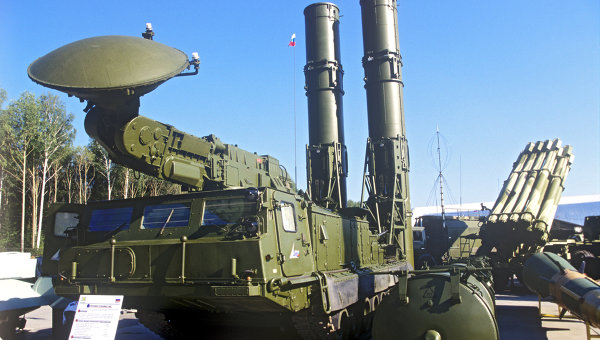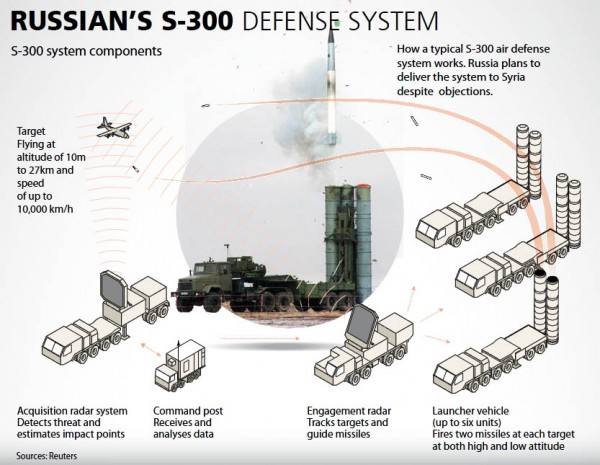
Despite working closely with Israel’s traditional enemies, Syria and Iran, during Syria’s civil war, Russia has managed to maintain a good relationship with Israel. But it could be about to sour.
By Fred Weir
and Joshua Mitnick
Russia has just taken a huge gamble in Syria.
It will greatly strengthen Moscow’s hand in determining the endgame in the seven-year-old civil war if it works. But it might lead to wider conflict if other powers accustomed to intruding into Syrian airspace with relative ease, particularly Israel, decide to challenge the move.
The Russians have indicated that they will effectively impose what is known as A2/AD (anti-access/area denial) over the entire Syrian theater by supplying Syrian forces with advanced S-300 anti-aircraft systems. The missiles will be integrated into a single, computerized air defense network and supported by Russian-provided electronic jamming measures. It’s not quite a “no fly zone,” since the Russians would be required to announce and enforce something like that directly.
Experts say the system, which Moscow claims will be up and running within two weeks, will be under the nominal control of Syrian forces, but will almost certainly have a Russian finger on the trigger. If the move is implemented, it will compel the Israelis – who have launched 200 airstrikes against Syria in the past 18 months – as well as other active powers such as Turkey and the US-led coalition, to consult much more closely with Moscow if they wish to pursue their separate military objectives in Syria, or risk taking losses.
Deconfliction
 The Russians have been mulling this move since 2013, when they first acceded to Israeli requests to suspend a planned sale of the S-300s to Syria in order to preserve “regional stability.” What prompted them to change their minds was the Sept. 17 “friendly fire” shootdown of a Russian Il-20 reconnaissance plane by an old Soviet-made Syrian S-200 missile, killing 15 Russian military personnel, near Russia’s Khmeimim airbase in Syria during or – depending on whom you believe – immediately after a major Israeli airstrike on a nearby Syrian military base.
The Russians have been mulling this move since 2013, when they first acceded to Israeli requests to suspend a planned sale of the S-300s to Syria in order to preserve “regional stability.” What prompted them to change their minds was the Sept. 17 “friendly fire” shootdown of a Russian Il-20 reconnaissance plane by an old Soviet-made Syrian S-200 missile, killing 15 Russian military personnel, near Russia’s Khmeimim airbase in Syria during or – depending on whom you believe – immediately after a major Israeli airstrike on a nearby Syrian military base.
There were a few days of confusion in Moscow. Vladimir Putin, who has maintained a very close relationship with Israeli Prime Minister Benjamin Netanyahu, initially sounded ready to blame the incident on the fog of war. His Defense Ministry, however, insisted the attacking Israeli F-16s had “set up” the lumbering turboprop Il-20 by hiding behind its radar signature and making it an easy target for the Syrian missile, which is so old it lacks any ability to distinguish friend from foe. Two starkly different narratives about what happened still remain in play, but the Kremlin has clearly decided to accept the version offered by its own Defense Ministry.
“Putin is not only president, he is also commander in chief of the armed forces,” says Alexander Sherin, deputy chair of the Russian State Duma’s defense committee. “The military are obliged to explain these things to the Russian people, so possibly they just sound tougher. Maybe the president was a bit more diplomatic. But everyone agrees this is a step we had to take a long time ago. We cannot allow Syrian airspace to be turned into a public thoroughfare.”
Until now, Israel has courted Moscow to cultivate understandings on “deconfliction.” The mechanism, which reportedly includes a hotline between the militaries, allows Israel to target weapons shipments destined for Hezbollah or Iranian-allied forces in Syria, even as Russia maintained overall control in Syria in a loose alliance with Iran. The arrangement that Mr. Putin previously had with Mr. Netanyahu acknowledged that Israel has legitimate security concerns, particularly in Syria’s southwest, where the Israeli-occupied Golan Heights meets Syria proper.
Russia claims it has obliged Israel by helping to roll back Iranian-linked forces from that area. It has also allowed Israel to pursue other prongs of its strategy to contain Iranian influence in Syria: blocking the transfer of advanced weapons to Hezbollah that would substantially erode Israel’s advantage, and preventing the entrenchment of Iranian and Iranian-allied forces in Syria that could serve as a front of conflict.
It is a complicated understanding, heavily dependent on mutual goodwill, which has now somewhat evaporated. Some suggest a new arrangement will need to be worked out, where Russia has the upper hand.
“This changes the rules of the game. We will feel much less confident in attacking Syria, which will make the life of the Iranians easier,’” says Alon Liel, a former director general of the Israeli Foreign Ministry. “Israel needs Russia very much and won’t risk a conflict.”
A difference-making weapon?
The late-version S-300 system that Russia plans to install in Syria, to cover the country’s entire airspace, is not a Russian top-of-the-line air defense weapon. But it is a relatively recent member of a class of long-range, multi-target-capable anti-aircraft systems developed over decades by the Soviet Union and Russia that have no counterparts in the US arsenal. That’s only because the US, historically, has no need of a weapon to defend against massed air attack.
But although the S-300 has never been tested in combat against modern Western aircraft, most analysts agree it would be foolish to discount it.
“The S-300 can prevent uninvited air strikes in Syria,” says Konstantin Sivkov, an expert with the official Russian Academy of Missile and Artillery Sciences. “These other countries, like Israel, will have to change their tactics, and perhaps that will lead to further stabilization of the situation. If not, Syria could become the detonator of World War Three, God forbid.”
Israeli defense analysts say Israel has been preparing for the S-300’s deployment for over a decade, and that it may not prove as significant an obstacle to Israeli operations as the Syrians and Russians might hope. But at the very least, Israel will need to be more circumspect in pursuing its goals in Syria. That might involve giving Moscow more advanced warning of a strike and holding fire in case planes are attacked by new advanced air defense systems supplied by Moscow for fear of endangering Russian personnel.
Israel will have to “be more careful than ever,” says Eyal Zisser, a political science professor at Tel Aviv University. “If you see a Russian airplane, don’t gamble that the Syrians will miss. It’s not in Israel’s interest to get into a conflict with a superpower like Russia.”
‘It’s a big poker game’
It seems most likely that the close Putin-Netanyahu relationship will re-assert itself, and a new modus vivendi will take hold. But not necessarily.
“We shouldn’t be confused: The very important friendship between the leaders ultimately doesn’t outweigh [geopolitical] interests,” Mike Herzog, a former military adviser to Israeli Prime Minister Benjamin Netanyahu, said in an interview with Israel Army Radio. “And the Russians have their own interests, and they’re not identical to Israeli interests. Let’s not forget they fought alongside Iran to save Assad.”
It seems certain that the long-running, bitter, multi-sided war in Syria has entered a new phase, perhaps a more dangerous one. Russia is hoping this gambit will ratchet down the free-for-all air war over Syria, and force the various players to step back and mediate their interests in the region through Moscow. If it works, a Russian-authored Syrian endgame might be within sight. But if it doesn’t?
“It’s a big poker game,” says Alexander Golts, an independent Russian military expert. “We don’t really know how effective the S-300 would be in blocking Israeli incursions or thwarting US cruise missile attacks. So, it’s a bluff. But is anyone prepared to call it?”
CSM

Leave a Reply
You must be logged in to post a comment.